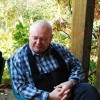The founder of the Sōtō Zen school is a 13th century monk named Eihei Dōgen. He was a prolific writer and his writings form the definitive parameters of this school of Zen. He wrote about almost every aspect of monastic life right down to the most intimate details. He also wrote about the more abstract aspects of monastic life and the unfolding of the Bodhisattva Vow, which is the whole reason of being for any Mahayana monastery. Much of Dōgen's focus is on the peculiarities of monastic practice but nevertheless we can learn a lot about how he envisioned a practical lifestyle and tried to choreograph through the form, a working version of the Middle Way.
Even though Buddhism as a religion and a moral framework is not harshly prescriptive, Buddhist professionals, the monks, lived a monastic regime which was highly structured and rigorous. The purpose of this rule-bound existence is to 'shorten the history' in the sense of spiritual evolution and get right to the goal, enlightenment and the end of suffering. In Zen Buddhism this enlightened being is called a Bodhisattva, a Sanskrit term which just means 'awake being' but which also prioritizes the welfare of beings-in-general. Dōgen wrote an essay on how to be a Bodhisattva. Not the transcendental Bodhisattvas that are represented on altars and featured in the classic sutras, but the moment by moment, everyday experience of maintaining fidelity to the religious idea of it.
This means cultivating openness to every aspect of human life. The key is the idea of receptivity writ large and carefully investigated. As a meditator gains experience in receptivity, Dōgen predicts and prescribes four, overlapping, influences that come into greater play, everyday. They are: generosity, kind speech, beneficial action and skillful means. These four mark the parameters of the Zen version of what an ideal human life should entail. All of these qualities require investigation. Buddhists generally trust meditation to be the best way to investigate all these qualities. There is also study, and this is almost as important as the meditation.
Dōgen is a skillful writer and for this essay I want to point out how his definition of 'generosity' is so helpful not just for those who wish to study the Middle Way but also for anyone who would like to make a change in their life. Dōgen summed up generosity as “non-greed”. This is a wonderful definition. It is both a touchstone for personal behaviour and an initiating energy for real things like legislation and law enforcement. But it is not a template. Each person makes their own from this simple definition. The effect behind the idea of minimizing opportunities for greed to flourish puts a premium on selflessness. There really is no cultural template of someone who understands the power of not-doing. Doing not-doing is a Zen thing marked with 'no trace'.
This is a critical teaching from Dōgen and it is found frequently in his writings; that bringing cessation to certain states of mind is a positive influence in the real world and is consistent with the Bodhisattva Vow, i.e. the expressed wish to “save all beings”. Dōgen's insight is that it is much easier for people to stop behaving in one way than it is to conform to some template, including the saintly templates of all religions and ideologies. The religious issue is always suffering and harm, in a Buddhist context. By become sensitive to the initial conditions of greed, a “poison” in Buddhist parlance, the meditator is acting with generosity to all beings.
 Wayne Codling is a former Zen monastic and a lineage holder in the Soto Zen tradition as taught by the Japanese Zen master, Shunryu Suzuki-roshi (Zen Mind, Beginner’s Mind). He teaches Zen style meditation in various venues around Victoria, including regular, drop-in, no charge sessions each Sunday at the Vic West Community Centre and regular classes with young offenders at a correction centre. Wayne’s talks and some writings can be found on his blog (http://sotozenvictoria.wordpress.com), and practice questions are responded to at: http://zendog.ca
Wayne Codling is a former Zen monastic and a lineage holder in the Soto Zen tradition as taught by the Japanese Zen master, Shunryu Suzuki-roshi (Zen Mind, Beginner’s Mind). He teaches Zen style meditation in various venues around Victoria, including regular, drop-in, no charge sessions each Sunday at the Vic West Community Centre and regular classes with young offenders at a correction centre. Wayne’s talks and some writings can be found on his blog (http://sotozenvictoria.wordpress.com), and practice questions are responded to at: http://zendog.ca
You can read more articles from our interfaith blog, Spiritually Speaking HERE


